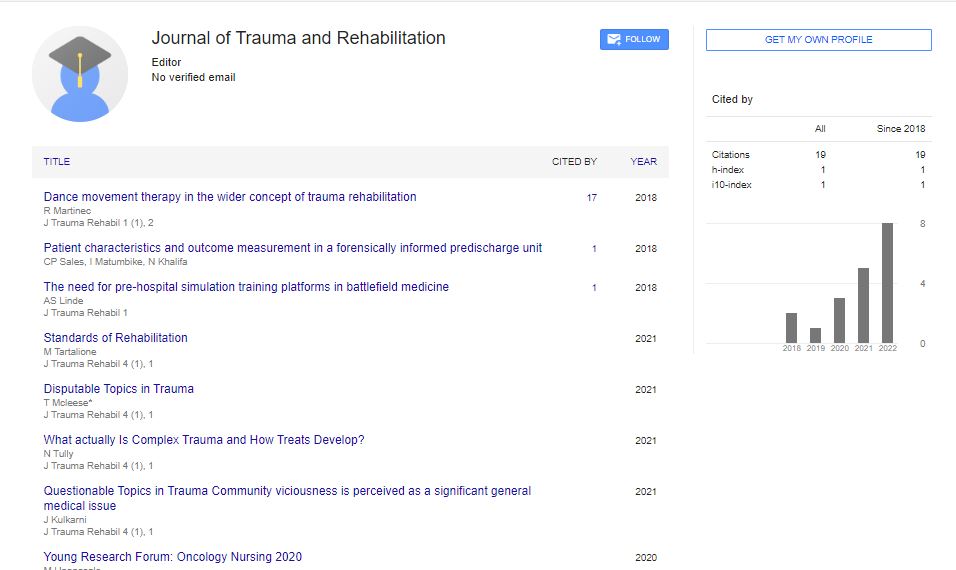Opinion Article, J Trauma Rehabil Vol: 6 Issue: 4
Advancements in the Neurosciences of Traumatic Brain Injury
Covaliov Ament*
1Department of Neurosurgery, Oslo University Hospital, Oslo, Norway
*Corresponding Author: Covaliov Ament,
Department of Neurosurgery, Oslo
University Hospital, Oslo, Norway
E-mail: covamen@medisin.uio.no
Received date: 24 November, 2023, Manuscript No. JTR-24-127955;
Editor assigned date: 27 November, 2023, PreQC No. JTR-24-127955 (PQ);
Reviewed date: 11 December, 2023, QC No. JTR-24-127955;
Revised date: 18 December, 2023, Manuscript No. JTR-24-127955 (R);
Published date: 26 December, 2023, DOI: 10.4172/Jtr.1000140
Citation: Ament C (2023) Advancements in the Neurosciences of Traumatic Brain Injury. J Trauma Rehabil 6:4.
Description
Traumatic Brain Injury (TBI) represents a significant public health concern, with major consequences for individuals and society at large. In recent years, the field of neurosciences has witnessed remarkable advancements in understanding the complex mechanisms and effects of TBI. Neuroimaging advances at the core of TBI analysis that has been revolutionized the ability to visualize and comprehend the extent of brain injury. Magnetic Resonance Imaging (MRI), Diffusion Tensor Imaging (DTI) and functional MRI (fMRI) now enable clinicians and analysts to assess structural and functional changes in the brain with unprecedented precision. These techniques provide vital inputs into the localization and severity of injuries, allowing for more informed treatment decisions.
One of the important advancement in neurosciences is the growing recognition of the heterogeneity of TBI. It is increasingly understood that the consequences of a TBI are highly individualized, influenced by factors such as the nature of the injury, pre-existing conditions and genetic predispositions. Advancements in neurogenesis have revealed the specific genetic markers that may influence susceptibility to TBI and impact the trajectory of recovery. This personalized approach has potential for customizing interventions to an individual's unique genetic profile. On a molecular level, analysts are delving into the complex cascade of events that occur in the brain following traumatic injury. Neuroinflammation, excitotoxicity and oxidative stress are among the molecular processes that can exacerbate damage after the initial injury. Customizing these processes pharmacologically is an area of active investigation.
Anti-inflammatory drugs, antioxidants and neuroprotective agents are being explored as potential interventions to minimize the secondary damage associated with TBI. Advancements in neurobiology have additionally illuminated the complex cellular responses to TBI. Neuronal plasticity, the brain's ability to reorganize itself, has been identified as a key factor in recovery. Understanding the mechanisms that drive this plasticity opens avenues for therapeutic interventions aimed at enhancing the brain's natural capacity to adapt and heal. The role of neurotransmitters in the impact of TBI is another aspect garnering attention. Disruptions in neurotransmitter systems, particularly involving glutamate and dopamine, can contribute to cognitive and behavioral deficits observed in TBI patients. Pharmacological interventions customizing these neurotransmitter imbalances have potential for ameliorating symptoms and improving functional outcomes.
Furthermore, advancements in neurotechnology are influencing the assessment and rehabilitation of TBI. Virtual Reality (VR) and Augmented Reality (AR) platforms are being integrated into cognitive rehabilitation programs, providing immersive and interactive environments for therapeutic interventions. Brain-Machine Interfaces (BMIs) are being explored to enhance communication and motor control in individuals with severe TBI. These technological innovations signify an improvement in the context of neurorehabilitation, providing novel and engaging approaches to support recovery. The field of neurosciences is also witnessing progress in the understanding of the chronic effects of TBI, such as Post-Traumatic Stress Disorder (PTSD) and neurodegenerative conditions. Analysts are exploring the neurobiological links between TBI and the development of neurodegenerative diseases like Alzheimer's and Parkinson's. This knowledge is important for developing preventive strategies and customized interventions to minimise long-term consequences.
Conclusion
Clinically, the integration of neuroscientific advancements has implications for precision medicine in TBI management. Biomarkers, measurable indicators of physiological or pathological processes, are being identified to aid in the diagnosis, prognosis and monitoring of TBI. These biomarkers provide objective measures that complement traditional clinical assessments, allowing for more accurate and timely interventions. The neurosciences have become a driving force in advancing the understanding of TBI. From decaying the molecular and genetic foundations for utilizing innovative technology in neuroimaging and neurorehabilitation, these developments have potential for more precise diagnostics, customized interventions and improved outcomes for individuals affected by TBI.
 Spanish
Spanish  Chinese
Chinese  Russian
Russian  German
German  French
French  Japanese
Japanese  Portuguese
Portuguese  Hindi
Hindi 